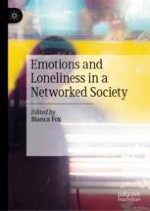2019 | OriginalPaper | Chapter
10. Experiences of Loneliness: People with a Learning Disability and Barriers to Community Inclusion
Author : Liz Tilly
Published in: Emotions and Loneliness in a Networked Society
Publisher: Springer International Publishing
Activate our intelligent search to find suitable subject content or patents.
Select sections of text to find matching patents with Artificial Intelligence. powered by
Select sections of text to find additional relevant content using AI-assisted search. powered by
